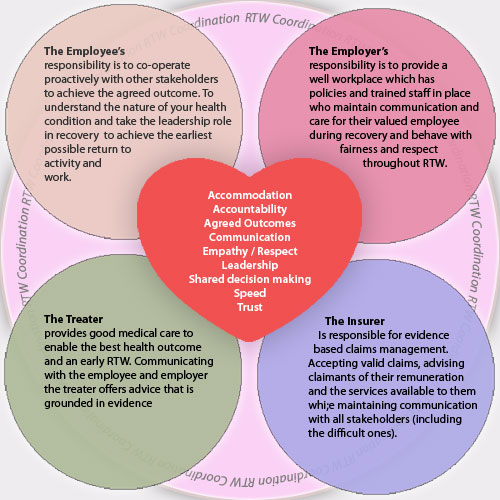Principles underlying RTW - Draft 3

The process of drafting this article has revealed that we not only have to consider ‘principles’ but also an ‘attitude’. One person also suggests we consider ‘beliefs’, but until I see something substantial on that front we’ll stick with the first two.
In this 3rd draft of the Principles underlying RTW we have established that the principles in alphabetical order are:
- Accommodation
- Accountability
- Agreed Outcomes
- Communication
- Empathy / Respect
- Leadership
- Shared decision making
- Speed
- Trust
The context in which these principles are to be applied is important.
Worldwide an injured or ill worker with a compensation claim is in a different position to a person with the same health condition who is outside of the system. People outside the system have medical advice and treatment, but otherwise are accountable only to themselves for recovery and RTW. The evidence is that health outcomes and successful RTW rates are better outside the system.
Being a claimant introduces a minimum of four stakeholders who have an interest in the worker’s recovery and RTW. Employee, employer, treater, insurer. Each stakeholder is not an individual but a group within which subsidiary players each have their own interests and responsibilities. Each new interest increases the possibility of a conflict of interest.
Added to this is a local problem. In Australia workers compensation legislation exists to support injured employees in their time of need. However, the fundamental concept contains a conflict of interest – it is an insurance scheme paid for by the employer, which benefits the employee. There is constant cost reduction pressure on one side in conflict with a perennial desire for increased benefits on the other.
The creation of statutory authorities to administer the legislation in different jurisdictions does not resolve this conflict, but simply transfers its focus to the ‘authority’ which becomes the meat in the sandwich and, despite the professional niceties, on the nose with everyone.
This fundamental conflict resides in the fundamental nature of workers compensation in Australia and must be dealt with by the proactive acceptance of a greater common good - the wellbeing of the person at the centre - before any set of principles to guide RTW can be applied to resolve the more personal and individual interests and accountabilities involved.
Hence: love that worker, treat their recovery and RTW as you would a member of your own family is an attitude that works. It is not idealistic touchy feely nonsense, but the best available risk mitigation practice. It results in the best health outcomes and the speediest return to work for employees and that is the most cost effective result for the employer.
| Stakeholder Group | If everyone else behaves as they should this is what I will do |
|---|---|
| Employee | My role is to do my best to understand the nature of my health condition and its cause, then take the leading role in my recovery. Maintaining contact with work I take a proactive approach to working out the useful contribution I can make at work and return as soon as possible. |
| Employer | We work with our staff to provide a safe workplace, with early care for people with health problems. Our RTW Coordinator and supervisors are in contact with employees with a health problem, seeking to understand their issues and concerns, and let them know what is available to them. We work with them to overcome barriers. We bring trust, speed, empathy, respect and a willingness to accommodate to the achievement of the outcomes agreed with our employees. |
| Treater/s | Understanding that patients’ health outcomes are worse if they remain off work, I provide quality care for their health problem AND support the patient to return to work. Despite the fact that these consultations take longer, I provide the patient with an understanding of their problem, advice about how they can improve their condition and a sensible framework for work restrictions. Communication with the employer is an essential component of patient care and I do this in conjunction with the employee. |
| Insurer | Most claimants return to work quickly and our role is to simply process the relevant paperwork. Other claimants require active support from me. My role is to inform the claimant about the system, what they can do to improve their outcome, to efficiently respond to requests for treatment, and ensure they receive their wages on time. I work with the employer to support their efforts, and let them know what they can do to help motivate the claimant. |


